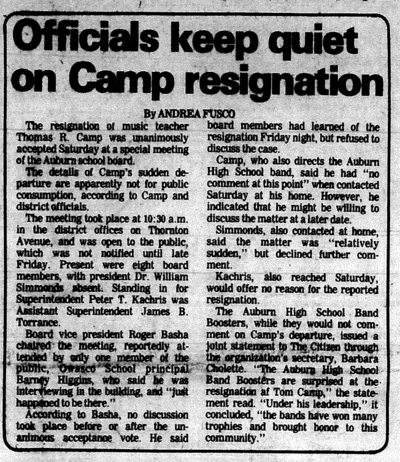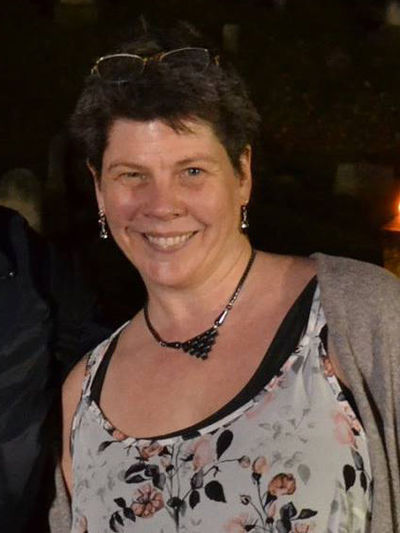Decades Later, Women File Sex Abuse Complaints in Cayuga County, Push for Law Changes
By Megan Blarr
Pamela Deacon O'Grady remembers the first time she met him. It was the summer of 1978. A clarinet player at Auburn High School, O'Grady was learning the music for the fall marching band. She had just graduated from eighth grade. "I walked in (the high school band room) and saw him for the first time," she said. "I remember how nervous and intimidated I was ... because he was so tall." He was her music teacher. She was 14 years old. For the next five years, O'Grady said, he would sexually abuse her — in the band office, in the auditorium, in his car and in his home. He told her not to tell. "I never told the secret," O'Grady said, "until now." But now, she said, it's too late. "Due to New York's statute of limitations, it's too late to press charges," she said. "Because of the statute of limitations, there is nothing I can do." That could change, however, for future sex abuse victims, as proposed state legislation aims to extend or eliminate the statute of limitations. Raising awareness about the law and why it can take some victims many years to bring forth accusations is one reason O'Grady and another woman — who said she was sexually abused in the early 1980s by a current Cayuga County resident — brought their stories to law enforcement and The Citizen in recent months. "It has taken me 20 years of counseling to get to a point where I can tell my story," O'Grady said. "I just don't want this to happen to anyone else." The abuse O'Grady grew up hungry. Born and raised in Auburn, O'Grady was one of four daughters, all of whom feared their father. For years, she said, the girls suffered physical and emotional abuse at home, and she was starved of affection. Then, when her parents divorced, she was also starved of food. "We were financially very poor and my dad was primarily absent from my life," O'Grady said in an interview at The Citizen in June. "I can remember opening the refrigerator and there would be a package of sliced American cheese and a gallon of powdered milk. That was it."
But then O'Grady joined the marching band at AHS, and the band director — Thomas R. Camp — took an interest in her family. Camp became what O'Grady called the "family helper," giving the girls rides home from school and cutting down the family Christmas tree. More importantly, she said, he had food. "This was when there began this slow process of connecting with me, which led into a sexual relationship throughout my high school years," O'Grady said. "It was a textbook grooming process." It began on back roads, which Camp — 21 years her senior — took on their rides home from band practice. At first, she said, he would place a hand on her leg or give her hugs, telling her she was special. But as time progressed, the relationship turned sexual. "I would do exactly what he told me to do," she said. "After eating the food (he brought), there was always some sort of sexual act. He told me that I couldn't tell anyone about our relationship because he wouldn't be able to see me anymore. I couldn't understand that." The Citizen reached out to Camp earlier this month — he denied the accusations of child sex abuse. O'Grady said their relationship went on for years, extending from when she was in the high school band until she was a sophomore in college. In high school, she said, she learned to get in Camp's car and lay face first on the back seat, or kneel on the floor under the glove compartment to hide herself. And Camp began to take more risks, abusing and raping O'Grady on and off school grounds. Then, at the end of her junior year at AHS, O'Grady said, she and Camp were caught. On Friday, June 13, 1980, O'Grady said district administrators spotted Camp dropping her off at school. She was getting her bicycle, which she had hid in the bushes, when two administrators pulled up. "I realize now that they wanted to catch him with me," she said. "(One administrator) came over to the bushes and said, 'We know what's going on and I know you are in there.' Then, he left me there." The next day, Camp resigned. But the abuse continued. According to O'Grady, school administrators never again spoke with her, her parents or law enforcement about the matter. And O'Grady kept seeing Camp in secret for the next three years. In a phone interview Dec. 8, Camp said O'Grady's claims were not true. While he acknowledged dating O'Grady when she was in college, he said he never had an inappropriate relationship with her or any other student at AHS. "I got close to a lot of the students, boys and girls," Camp said, noting that he also became close with a lot of families through the music boosters. "That's just part of the nature, I guess, of being a band director. "I don't know if (O'Grady) just misinterpreted some of that," he added. As for Camp's resignation, the former band director said he left AHS because of "all the administrative hassle" and a growing spotlight on sports, something Camp had no interest in. "(The administration) wanted me out and they were making things unpleasant and I just kind of had enough finally," Camp said. "I would say the biggest reason was probably that they were pretty sports-oriented at the time ... which meant me spending a lot of time with things that were not related to music." After speaking with Camp, The Citizen contacted several former administrators who were involved with his resignation. Roger Basha, the vice president of the Auburn board of education at the time, recalled the issue. In a phone interview, he said he had to be "careful" about what he said. "I'm sure, in my memory, that sports had nothing to do with his resignation," Basha said. "I'm sure of that." Former Auburn Superintendent Peter Kachris agreed. "I emphatically deny that it was about sports," Kachris said in a phone call with The Citizen. "I remember the circumstances very, very clearly and it had nothing to do with sports. Any notion that sports were being over-emphasized would had to have been in Tom Camp's mind." When asked if the board had concerns about Camp's relationship with O'Grady, Basha said their "serious concerns" weren't isolated to one student. "To my knowledge, it wasn't so-called 'isolated,' but it was the one so-called 'provable incident,'" he said. "It wasn't a formal investigation. We were following the advice of the administration, and the administration seemed to think that they had a valid reason for wanting (Camp to resign)." While Kachris said he did not want to "say too much," the former superintendent confirmed that he asked Camp to resign on a Friday afternoon. The board accepted that resignation at an emergency meeting the next morning.
The Citizen file "For the benefit of any student involved or any of the staff that was involved, the board wanted to take proper action," Basha said. But for O'Grady, it wasn't enough. "I, as the child victim, didn't understand that this was statutory rape," she said. "There was no one there to help me as the victim of a crime — no one there to explain it to me. The school administration left me in the bushes. ... They never protected me or got me the help that I needed." The impact It took 12 years before O'Grady realized what had happened. At 31 years old, by then a married mother of two, O'Grady struggled to watch TV — anything that showed abuse made her very emotional and angry — and she did not want to be touched. But she didn't know why. "At first, I couldn't remember a lot of things," she said. "I had buried it in my mind. ... However, I knew something was wrong with me. So I started going for counseling and began to understand what had happened to me." Soon, O'Grady became flooded by memories and the successful businesswoman found it more and more difficult to get out of bed in the morning. She began to cut back on work, going in three days a week until she had to quit her job entirely. Then, she said, she no longer wanted to live. O'Grady was ultimately diagnosed with clinical depression and post-traumatic stress disorder. She was prescribed medication and placed in an outpatient hospitalization program, and for the next decade, she struggled to survive. "I felt that I was guilty, that it was my fault, that I was bad, and I was so scared of myself and who I was," she said. "There was such shame, so intense and so deep that I couldn't function. ... There were so many times that I wanted to give up and take my life." Gary Greenberg, an upstate investor and advocate for child victims, said it typically takes survivors more than 20 years to address and disclose their abuse. "The average age is usually around 38 or 39 for a woman and 40 or 41 for a man to come forward, and that's because something typically brings back memories," he said. For both O'Grady and Greenberg, that something was therapy. In 1967, when Greenberg was 7 years old, he said he was molested by a male orderly at a hospital in the Albany area. But, despite telling his parents, the hospital and police about the abuse, Greenberg said the authorities suggested he and his family "forget about it." So he did, until he sought treatment in his late 20s. Then, in 1997, Greenberg saw a picture of a man named Louis VanWie on TV and he immediately recognized his abuser. He again went to police. This time, he wasn't alone. In the end, Greenberg said he was one of 125 people to contact police about VanWie, who confessed to sexually abusing over 300 children in 30 years. However, due to state law, only two cases could be prosecuted. "VanWie got away with it for so long and he was only able to be stopped because of two out of more than 300 cases," Greenberg said. "About 125 people came forward saying he had abused them or a relative, but they couldn't use any of them because the statute of limitations were up." VanWie was ultimately sentenced to 30 years in prison for abusing two young girls in 1996. Meanwhile, Greenberg began lobbying for changes in legislation. Now, O'Grady is too. The law When O'Grady first began counseling in her early 30s, she said she finally felt ready to tell someone about her abuse. At the time, she said she visited her hometown and went to the Cayuga County District Attorney's Office to report what had happened to her decades earlier. However, due to the statute of limitations in New York state, authorities said there was nothing they could do. "It wasn't until I was in counseling that I realized that it was statutory rape of a minor and sexual abuse," O'Grady said. "But because of the length of time for a survivor to heal and understand what happened and get strong enough to report ... it is too late to press (criminal) charges." But proposed legislation could change that. In June 2017, the state Assembly passed A05885, or the Child Victims Act, a law that would extend the statute of limitations for survivors of childhood sexual abuse. Under current law, most felony sex offenses have a five-year statute of limitations that begins when the victim turns 18; only the class A felonies of first-degree rape, first-degree criminal sex act, first-degree aggravated sexual abuse and first-degree sexual conduct against a child have no time limit for prosecution. The Child Victims Act would give survivors more time to press charges, letting victims file criminal complaints until they turn 28 and civil action until they turn 50. In addition, the act would provide a one-year look-back window for adult survivors of childhood sexual abuse, allowing victims to revive time-barred cases in civil court. However, despite passing the Assembly for the first time since 2008, the act did not reach the state Senate for a vote. At the time, Senate Majority Leader John Flanagan said the act was under discussion, but would not be taken up in 2017. Locally, the Child Victims Act has support from most state representatives. Assemblymen Gary Finch and Bob Oaks both voted to pass the Child Victims Act this summer and Sens. Pam Helming and James Seward have expressed interest in backing the bill in the 2018 Legislative session. Both said they believed more could be done. "I strongly believe that we need to do something to reform the law as it currently stands," Helming said.
State legislators representing parts of Cayuga County — Sens. John DeFrancisco, Pam Helming … Seward added, "Strong laws are needed to contend with such repulsive offenses ... ensuring that those who commit these crimes are punished severely." However, there has been some hesitation. Sen. John DeFrancisco said he does not support changes in legislation, including another bill — Senate Bill S809 — that would eliminate the statute of limitations entirely. The deputy majority leader has frequently cited faded memories and difficulty finding witnesses as reasons to keep the statute of limitations in decades-old cases. "There must be a balance of the rights of the alleged victims and of those accused of committing crimes," DeFrancisco said. "By totally eliminating the statute of limitations, the balance that would be struck would be too skewed against those accused." Still, despite some concerns in the Senate, Greenberg said he is hopeful for change in 2018. "We're up to another legislative session and with all of the publicity around campaigns like #MeToo ... we're hoping this year we can finally get over the finish line," he said. The options When O'Grady was finally ready to come forward with her abuse, there weren't many avenues for her to take. After speaking with the Cayuga County District Attorney's Office in the mid-1990s, O'Grady said, she returned to her home in Colorado to continue counseling. But over the years, she said, she couldn't accept that there was nothing the authorities could do, and she worried there could be more victims. So in May, O'Grady paid another visit to her hometown, and at 54 years old, she confronted Camp with a phone call. His wife answered. "I told her I was a student of her husband's and was wanting to know the best way to reach him," O'Grady said. "She handed him the phone." At first, O'Grady said the former band director seemed friendly and agreed to meet with her in private. But five days later, Camp phoned to say he'd changed his mind — he wanted to meet with a mediator. "He asked what good could come from meeting after all these years," she said. "In all these phone conversations with him he never once took accountability for what he did to me as a child or said that he was sorry." Camp confirmed he'd had a handful of phone calls with O'Grady in the past four or five months. He said he was "very willing" to meet with her and a mediator, but was advised not to meet with O'Grady alone. "I talked to a number of people here and they said ... do not meet with her alone because it sounds like she's trying to blackmail you," he said. As to why O'Grady would accuse him of sexual assault, Camp said he thought she might be bitter about the way their relationship ended when she was in college. "This is really kind of a kick in the head that she's doing this now after 40 years, and I don't know why," Camp said. "I don't know if she's just really disappointed because of the way things turned out, trying to get back at me, or because of all this other stuff that's been going on in the papers now." In the end, O'Grady never met with Camp. Instead, she said she sent letters to him, his wife, his ex-wife and the pastor at his church. She also sent letters to the former administration of her high school as well as the current Cayuga County district attorney, Cayuga County sheriff and Auburn chief of police. In cases like this, Auburn Police Chief Shawn Butler said his first step would be to take the complaint and speak with the district attorney on the time frame and statute of limitations. "Back then, depending on when the crime took place, it's kind of grandfathered in," he said. "Whatever the law was then, that's what we have to adhere to. And that's unfortunate. ... I don't agree with all the laws, but unfortunately, these are the guidelines that we have to work with." While Butler said he understands the reasoning behind the statute of limitations, as police chief he also knows the importance of holding suspects accountable, not only to keep the community safe but to also provide victims a sense of healing. "As a law enforcement official, it's hard to prove a case 20 years later," Butler said. "You don't have evidence. All you have is a memory or a recant. ... Our ultimate goal is a conviction and how do you prove that?" Cayuga County Sheriff David Gould agreed with the police chief's assessment, expressing similar concerns with prosecuting old cases. But, like Butler, he said he'd like to see changes in the law. Gould's law enforcement career began in 1970 when he became an investigator with New York State Police in Auburn, and while he has seen great strides in technology and the use of a multidisciplinary approach, he said more should be done. "We have to start somewhere," Gould said. "It's getting better, but a new law would help us immensely. We have to start a new law because the reality is there are going to be people abused in the future and 30 years from now we can go back and arrest somebody for it. ... It doesn't guarantee anything, but we can at least try." Cayuga County District Attorney Jon Budelmann said his office would always work to secure justice for victims and hold offenders accountable. However, barring the presence of DNA and digital evidence, he confirmed that the older a case is, the harder it is to prove. "I would never criticize someone for not coming forward right away, as there are many reasons victims may not speak out promptly," he said. "However, with the passage of time, physical evidence is lost, as well as eyewitness information. The absence of such independent, corroborative evidence normally makes it more difficult to prosecute cases." The likelihood Although it is rare for Butler's and Gould's departments to receive complaints dating back to the '70s and '80s, it does happen. In fact, they said, O'Grady's is the second decades-old case brought to their attention in the past year. Like O'Grady, Rebecca Newton Holley said it took more than 30 years until she was ready to tell her story. It began in 1981 when Holley was 13 years old. A resident of Cortland County, Holley had begun babysitting for a family friend. His name was Clair "Buck" Stephens, and he was a youth group coordinator at her church in Cortland.
During an interview at The Citizen in September 2016 — her husband, Tracy, by her side — Holley said Stephens had come home alone one night, his wife sick in the hospital, when the abuse began. "That's the first night he molested me," Holley said. "From then on it was very often, almost weekly, and I would babysit or go places with them and the same thing would happen." For years, Holley said she was sexually assaulted by the man who taught her how to sing in church. When she asked him to stop, she said Stephens prayed with her about it, and the concerns of multiple congregation members were ignored. Then, during her senior year of high school, Holley told her parents.
"My dad and the minister went to Buck's house and confronted him and he admitted it to them," she said. "And they decided his whole punishment was to leave the church, get counseling and tell his next church what happened." One of Stephens' next churches was in Cayuga County. Years later, Holley said she discovered Stephens had eventually moved to Auburn and started his own ministry, Advancing the Kingdom Ministries. She also found a stack of letters that had been sent between Stephens and her father, David Newton, discussing Newton's need for restitution and proof that Stephens had sought counseling. "I am still haunted by the possibility of you committing the same action with your own daughter, a niece, or another Christian family's daughter," Newton said in a typed letter dated March 11, 1988. "I can not (sic) get this out of my mind. ... I need the assurance that you are not ruining other girls and their family's (sic) lives." Now, Newton said he wished he had gone to the authorities. "(Buck) did very little as far as following through on many of our conversations," Newton said in a phone call. "If I had it to do over again ... I would have done things differently. I would have more than likely pressed charges and gone the legal route." The Citizen made multiple attempts to speak with Stephens about the alleged abuse. No phone calls were returned. Meanwhile, Holley said she grew up, got married and had two children. And for a while, she continued faith-based counseling, which centered on the need to forgive her perpetrator. But, she said, it wasn't enough. "I still believe his actions put those around him in danger," she said. "Since the statute of limitations has passed for me to involve the criminal justice system, I am attempting to raise awareness in the community." In October 2016, knowing Stephens still lived in Auburn, Holley and her husband met with APD Chief Butler and Det. Lt. Brian Schenck from the Cayuga County Sheriff's Office. And at 48 years old, she filed her first official complaint with the authorities. "They looked at some of the laws and tried to figure out something, but they said unfortunately there's nothing they can really do," Holley said. "But they were kind to me and it was at least nice that they tried to do something that should have been done a long time ago." The future O'Grady and Holley know they may never get their day in court, but both said they will continue to fight for new legislation and encourage other victims to contact the authorities no matter when the abuse occurred. "I didn't want this to happen to anyone else," O'Grady said. "Pedophiles typically have many victims and the only thing I could do was put a report in the system ... should there ever be another victim that comes forward." Holley added, "It has taken me these many decades to realize that I can stand up to my abuser, holding him accountable for his actions, empowering others who may have been abused to speak out and protecting future victims." With the next New York legislative session scheduled to begin Jan. 3, the Child Victims Act could soon come before state lawmakers once more. And given the recent sexual assault allegations against big names in Hollywood and Capitol Hill — names like Harvey Weinstein and Al Franken — the bill is expected to gain traction. "National events have propelled this issue forward and serve as a rallying point," the bill's Senate sponsor, Democrat Brad Hoylman, said in a recent Associated Press article. "I'm more optimistic than ever that this session will be the breakthrough that we've been waiting for." Meanwhile, local officials have invited victims to come forward and file a report, regardless of the statute of limitations. "I would encourage anybody that has come to that resolution in their life where they want to come forward: Don't be afraid," Butler said. "You may not get the result that you're hoping for, but at least we can investigate it and see if we can make a case." Budelmann added, "Society is far more educated and less judgmental of victims now than 30 years ago when they used to blame the victim and attack their reputation. Although many still worry about the stigma, I think it has gotten much better. ... But there is always more to be done."
|
.
Any original material on these pages is copyright © BishopAccountability.org 2004. Reproduce freely with attribution.





